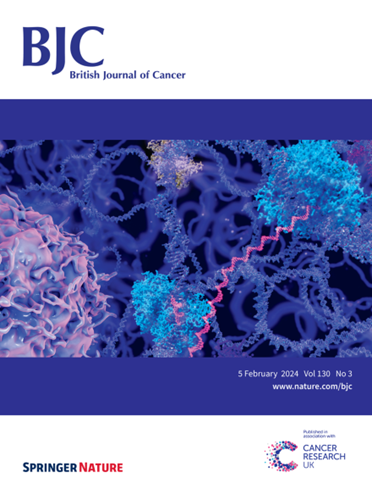Randomised phase-2 screening trial of intermittent energy restriction plus resistance exercise versus resistance exercise alone during chemotherapy for advanced breast cancer
IF 6.8
1区 医学
Q1 ONCOLOGY
引用次数: 0
Abstract
Weight control and energy restriction could improve survival in patients with advanced breast cancer (ABC) but randomised data are lacking. A randomised screening trial was conducted to assess an intermittent energy restricted diet and resistance exercise intervention (IER + RE) vs RE alone (RE) on progression free survival (PFS), toxicity and Quality of Life (QoL) during chemotherapy for ABC. Sixty-eight women were randomised to IER + RE (n = 35) or RE (n = 33) with one-sided significance assessed at the 20% threshold. The primary end point was PFS secondary endpoints included chemotherapy toxicity, weight change and QoL. The adjusted hazard rate for progression comparing IER + RE vs RE was 0.729 (0.391–1.361) and the median PFS 42.0 vs 26.1 weeks respectively (p = 0.160). Toxicity was low and comparable between groups. Comparing IER + RE vs RE alone at cycle 3 the median (interquartile range) changes were: weight –1.8 kg (–4.2 to –0.7) vs +0.2 kg (–0.74, 2.59) (p < 0.001), FACT-B + 4.0 (–0.8, 11) vs +1.0 (–4.0, 4.0) (p = 0.031) and Hospital Anxiety Depression Score –2.0 (–3.5, +0.5) vs +1.0 (–2, 3.5) (p = 0.022). IER + RE improved PFS and QoL without evidence of harms warranting a further larger randomised study in ABC. https://www.isrctn.com/ISRCTN12841416 .

晚期乳腺癌化疗期间间歇性能量限制加阻力运动与单独阻力运动的随机2期筛选试验
背景:控制体重和限制能量可以提高晚期乳腺癌(ABC)患者的生存率,但缺乏随机数据。进行了一项随机筛选试验,以评估间歇性能量限制饮食和阻力运动干预(IER + RE)与单独RE (RE)对ABC化疗期间无进展生存(PFS)、毒性和生活质量(QoL)的影响。方法:68名女性随机分为IER + RE组(n = 35)或RE组(n = 33),在20%阈值处评估单侧显著性。主要终点为PFS,次要终点为化疗毒性、体重变化和生活质量。结果:比较IER + RE和RE的调整后进展危险率分别为0.729(0.391-1.361)和中位PFS分别为42.0和26.1周(p = 0.160)。毒性较低,组间具有可比性。在第3周期比较IER + RE与单独RE的中位(四分位数范围)变化为:体重-1.8 kg(-4.2至-0.7)vs +0.2 kg (-0.74, 2.59) (p结论:IER + RE改善了PFS和QoL,没有证据表明存在危害,需要在ABC中进行进一步的更大的随机研究。试验注册:https://www.isrctn.com/ISRCTN12841416。
本文章由计算机程序翻译,如有差异,请以英文原文为准。
求助全文
约1分钟内获得全文
求助全文
来源期刊

British Journal of Cancer
医学-肿瘤学
CiteScore
15.10
自引率
1.10%
发文量
383
审稿时长
6 months
期刊介绍:
The British Journal of Cancer is one of the most-cited general cancer journals, publishing significant advances in translational and clinical cancer research.It also publishes high-quality reviews and thought-provoking comment on all aspects of cancer prevention,diagnosis and treatment.
 求助内容:
求助内容: 应助结果提醒方式:
应助结果提醒方式:


